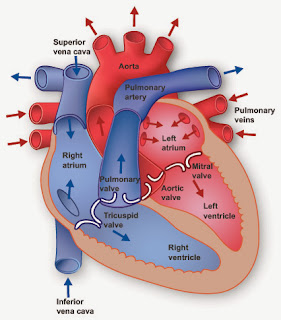Cholesterol and Your Heart
High blood cholesterol(high amout of cholesterol in blood) is known to contribute to
atherosclerosis, or hardening of the arteries, which
in turn increases your risk of heart attack and
stroke.
Now, researchers from the Saint Louis
School of Medicine have found out how it does this.
The researchers found, using an animal model,
that cholesterol limits the activity of transforming
growth factor-beta (TGF-beta), a key protective
protein that protects your heart's aorta and other
vessels from damage caused by hypertension, high
cholesterol, and other factors.
Cholesterol suppresses the responsiveness of
cardiovascular cells to TGF-beta, which allows
atherosclerosis to develop.
Atherosclerosis damages and narrows arteries of
your heart and other tissues, which prevents blood
from pumping through properly. This increases
your risk of heart attack and stroke.
The findings also suggest a possible mechanism by
which people with high cholesterol are at an
increased risk for other diseases such as cancer.
TGF-beta is a known tumor suppressor, and when
its protective effects become limited by high
cholesterol, it could increase your risk of certain
cancers.
The researchers hope their findings will lead to the
development of new drug therapies to treat or
prevent atherosclerosis.
Xubi Xhots
atherosclerosis, or hardening of the arteries, which
in turn increases your risk of heart attack and
stroke.
Now, researchers from the Saint Louis
School of Medicine have found out how it does this.
The researchers found, using an animal model,
that cholesterol limits the activity of transforming
growth factor-beta (TGF-beta), a key protective
protein that protects your heart's aorta and other
vessels from damage caused by hypertension, high
cholesterol, and other factors.
Cholesterol suppresses the responsiveness of
cardiovascular cells to TGF-beta, which allows
atherosclerosis to develop.
Atherosclerosis damages and narrows arteries of
your heart and other tissues, which prevents blood
from pumping through properly. This increases
your risk of heart attack and stroke.
The findings also suggest a possible mechanism by
which people with high cholesterol are at an
increased risk for other diseases such as cancer.
TGF-beta is a known tumor suppressor, and when
its protective effects become limited by high
cholesterol, it could increase your risk of certain
cancers.
The researchers hope their findings will lead to the
development of new drug therapies to treat or
prevent atherosclerosis.
Xubi Xhots



Comments
Post a Comment